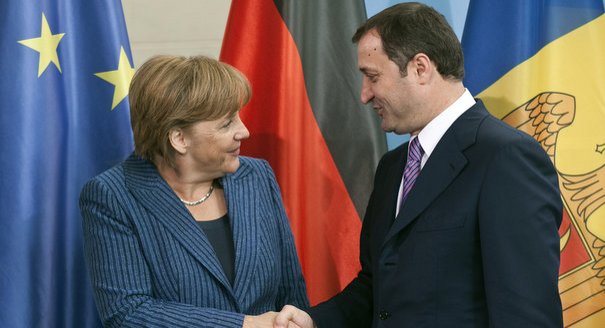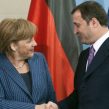
German Government Embraces Moldova’s European Agenda
Publication: Eurasia Daily Monitor Volume: 9 Issue: 160
By:

German Chancellor Angela Merkel’s August 22 Moldova visit is being described as “historic” in Chisinau (see accompanying article). The sheer rarity of such events in Moldova is one reason behind that description. Visits by Western leaders of comparable caliber were very few and far apart during 21 years of Moldova’s independence: French then-President Jacques Chirac in 1998, US Defense Secretary Donald Rumsfeld in 2004, US Vice President Joseph Biden in 2011. Those were one-off episodes without proper preparation, without deliverables, and without a follow-up process.
The German chancellor’s visit differs starkly in all those respects and presages enduring consequences in drawing Moldova closer to the European Union, conditional on Moldova’s reform performance. She held out the prospect of European integration for the country and all its citizens, including (as she repeatedly said) those in Transnistria as part of Moldova. Although she could not have carried an EU mandate, Merkel spoke on behalf of the EU’s weightiest country in Brussels and most influential in Chisinau, where a German diplomat heads the European Union’s mission. According to that diplomat, Ambassador Dirk Schuebel, Merkel’s visit “exceeded most people’s expectations” (Moldpres, August 30).
On this visit, Merkel shifted Berlin’s tone away from bureaucratic caution and toward positive political incentives. She assessed Moldova’s reform performance more favorably and more encouragingly than had previously been the case in Berlin. And while Germany does not participate in the 5+2 international negotiations on the Transnistria conflict, Merkel announced in Chisinau that she would pursue her 2010 Meseberg initiative on the Transnistria conflict (see below) directly with the Kremlin.
In Berlin as in Brussels, Prime Minister Vlad Filat is seen as leading Moldova’s reforms with his team. Moldova is currently rated as front-runner in the EU’s Eastern Partnership program. Admittedly, that program’s criteria fit Moldova’s circumstances more closely, compared with the other five participant countries. And after losing Ukraine at least temporarily by default, the Eastern Partnership looks to Moldova for a demonstration of the program’s success. This program is a Swedish-Polish initiative, backed by some European Commission officials, but otherwise under-resourced. Germany is no enthusiastic supporter of this six-country program, but is selectively backing Moldova’s aspirations. Filat has earned Merkel’s support during a series of bilateral meetings with her in Germany and at European People’s Party (Christian-Democrats) international conferences. The personality factor seems not without significance: “Your country’s thriving development is a goal very close to my heart,” Merkel declared in Chisinau (www.bundeskanzlerin.de, August 23).
Beyond this, however, Berlin seeks to incentivize Chisinau to go along with the Meseberg initiative, with all its uncertainties even for Berlin at this stage and its potential risks for Moldova. Under the Meseberg Memorandum, signed by Merkel with Russia’s then-President Dmitry Medvedev in 2010, Germany proposes a joint EU-Russia decision-making mechanism on European security, asking in return for a token of Russian cooperation in resolving the Transnistria conflict. Given the continental-scale implications of such a tradeoff, Transnistria may seem a low-cost ticket for Russia’s elevation into Europe’s deliberative councils. This German initiative lacks EU endorsement. Russia seems in no hurry to respond, possibly awaiting more specific German proposals. Meanwhile, Moldova has managed to circumvent its constitutional crisis (without yet resolving it) in March 2012 through the election of a state president. This made it possible for Merkel to schedule her long-expected visit to Moldova.
Merkel delivered a speech to the Parliament and a press conference in Chisinau. Unusually detailed, meticulously worded for nuance (the German original texts reveal this more clearly than the translations), and geared to ongoing and planned EU and German assistance programs, Merkel’s statements reflect thorough preparation and intentions to pursue a follow-up process. She announced Germany’s support for Moldova’s triple goal of signing an association agreement with the EU, signing a deep and comprehensive free-trade agreement, and completing the action plan for signing a travel-visa liberalization agreement with the EU. By the same token, Merkel cautioned Chisinau that it needs to persuade some other influential West European countries through its performance.
To assist Moldova toward those goals, Merkel announced that the EU has budgeted €122 million ($153.5 million) to support Moldova’s reforms in 2013. Germany is adding €15 million ($18.9 million) on its own behalf in 2013, as well as assigning economic and legal advisers to Moldova. “Rest assured that we in Germany do more than just acknowledge the readiness to reform in Moldova. We shall stand by you continuously with advice and assistance” (www.bundeskanzlerin.de, August 22, 23).
With this move, and citing the “more for more” principle (integration steps rewarding internal reforms), Germany positions itself at the forefront of West European countries receptive to Moldova’s aspirations. Noting that the Eastern Partnership is a framework program for six participant countries, Merkel underscored that each country is being evaluated individually, and she singled out Moldova as the one eligible for signing those agreements with the EU (see above): “That is a success of this government.” The target date for signing is the end of 2013 at the Vilnius summit during the Lithuanian presidency of the EU.




